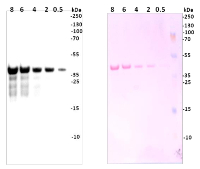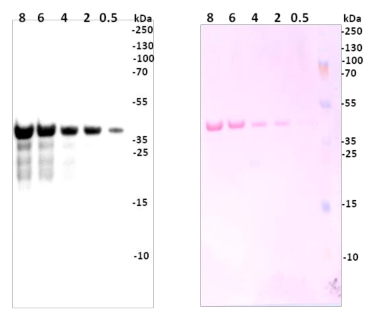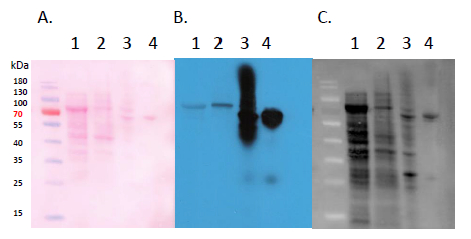1

Anti-GST-tag (rabbit antibody, polyclonal)
AS17 4147 | Clonality: Polyclonal | Host: Rabbit | Reactivity: GST-tagged proteins
- Product Info
-
Immunogen: GST protein Host: Rabbit Clonality: Polyclonal Purity: Immunogen affinity purified serum in PBS pH 7.4. Format: Lyophilized Quantity: 50 µg Reconstitution: For reconstitution add 50 µl of sterile water Storage: Lyophilized antibody can be stored at -20°C for up to 3 years. Re-constituted antibody can be stored at 4°C for several days to weeks. Once reconstituted make aliquots to avoid repeated freeze-thaw cycles. Please remember to spin the tubes briefly prior to opening them to avoid any losses that might occur from material adhering to the cap or sides of the tube. Tested applications: ELISA (ELISA), Western blot (WB) Recommended dilution: 1: 1: 1000 (ELISA), 1: 2000 (WB)
Expected | apparent MW: 26 kDa
- Reactivity
-
Predicted reactivity: native and denatured forms of purified GST or GST fusion proteins Not reactive in: No confirmed exceptions from predicted reactivity are currently known - Application Examples
-
Application example 
Samples with 8, 6, 2, 4, 0.5 µg of GST-tagged protein were denatured with Laemmli sample buffer at 70°C for 5 min and separated on 12,5% SDS-PAGE (Amresco). Proteins were blotted 1h to HybondTM-PVDF membrane (GE Healthcare) using semi-transfer (Bio-Rad) in standard transfer buffer in presence of 10% methanol. Transfer of proteins to membrane was checked using 1% Ponceau S staining before the blocking step. Blots were blocked in buffer (5% low-fat milk in 1xTBS, 0.1% Tween) with for 1 h at room temperature (RT) with agitation. Blots were incubated in the primary antibody at a dilution of 1:5 000 1 h at RT with agitation. The antibody solution was decanted and the blot was rinsed briefly twice, then washed once for 15 min and 3 times for 5 min in TBS-T at RT with agitation. Blot was incubated in secondary antibody (goat anti-rabbit IgG, HRP-conjugated, AS09 602, Agrisera) diluted to 1:25000 (Agrisera) in for 1h at RT with agitation. The blot was washed as above and developed for 5 min with Clarity Western ECL Substrate and ChemiDoc detection system (Bio-Rad).
Courtesy of Dr. Dr. Elena Pojidaeva, Laboratory of Plant Gene Expression Timiryazev Institute of Plant Physiology RAS, Russia
Samples:
1 - 100 ug of Escherichia coli extract expressing recombinant MBP-tagged PMI1 N-domain after induction with IPTG
2 - 50 ug of Escherichia coli extract expressing recombinant GST-tagged SnRK2.10 before induction with IPTG
3 - 50 ug of Escherichia coli extract expressing recombinant GST-tagged SnRK2.10 after induction with IPTG
4 – 1 ug of purified GST-tagged SnRK2.4
Total protein extract (samples 1,2 and 3) was prepared from E. coli by centrifuging 1ml of bacteria in LB before/after 3h of induction with IPTG for 5 min in 5000 rpm. Supernatants were decanted and pellets were suspended in water. Purified recombinant GST-tagged SnRK2.4 (sample 4) was suspended in Tris-HCl buffer pH 7.5. Samples were then denatured with 3x Laemmli sample buffer for 5 min in 95°C. Next samples were separated on 10 % SDS-PAGE stain-free gels (Bio-Rad) and blotted overnight to PVDF membrane using wet transfer. Blot was blocked with 3% milk and 0,1% Tween 20 in TBS for 1h/RT with agitation. Blot was incubated in the primary antibody at a dilution of 1: 5 000 for 1,5h/RT with agitation in 3% milk and 0,1% Tween 20 in TBS solution. The antibody solution was decanted and the blot was rinsed briefly, then washed 5 times for 5 min in TBS-T at RT with agitation. Blot was incubated in Agrisera matching secondary antibody AS09 602 (goat anti-rabbit IgG horse radish peroxidase conjugated) diluted to 1:30 000 in for 1h/RT with agitation. The blot was washed as above and developed for 1 min with chemiluminescent detection reagent. Exposure time was 2 min.
Courtesy of Dr. Katarzyna Szymańska, Institute of Biochemistry and Biophysics PAS, Warsaw, Poland - Additional Information
-
Additional information: Exact working dilution for each application needs to be determined experimentally Additional information (application): Overnight incubation of this antibody with dilution 1:5 000 with 0,5 µg of GST-tagged protein produced strong background but works fine with samples of total Escherichia coli lysate if GST-tagged protein is expressed in low amounts. - Background
-
Background: GST-tag (glutathione S-transferase) is a tag added to a protein of interest as a fusion protein to unable purification and detection. The tag is 220 amino acid long, ca. 26 kDa which makes it quite large compare to Myc or FLAG tags. - Protocols
- Antibody protocols
- Reviews:
-
This product doesn't have any reviews.

